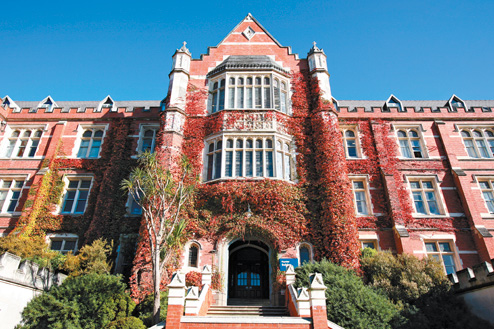University & Higher Education
The first university in New Zealand opened just over 130 years ago. Today there are seven universities and 24 polytechnics in the four main cities (Auckland, Wellington, Christchurch and Dunedin) and other provincial centres.
There are academic entrance requirements for all tertiary institutions. The National Certificate in Educational Achievement (NCEA) is the entry standard for university. To gain entry, students must achieve at least 42 credits at Level 3. Of these, 14 credits must be in mathematics at Level 1 or higher, and 8 in English or te reo Maori (4 in reading, 4 in writing). It is also possible to apply for discretionary entrance by achieving at least 80 credits at Level 2 in your best four subjects. Many universities require students to submit a recommendation from their school principal and some require students to write a motivational letter outlining their reasons for undertaking university study. These requirements are waived once you are 20 years old, however. Admittance to some courses, such as medicine and law, is keenly competitive and in these instances, only students with strong academic records are accepted.
Tertiary institutions are open to students who haven’t attended school in New Zealand. Each university, polytechnic and college of education has its own entry requirements for students educated overseas and they will require a certain level of proficiency in English. However, many do offer intensive language programmes to prepare students for classes.
All universities offer general undergraduate and graduate degrees and diplomas in arts, sciences and commerce, as well as specialist degrees in particular disciplines. Undergraduate degrees such as a BA (Bachelor of Arts) or a BSc (Bachelor of Science) generally take three to four years to complete. Each university publishes an annual calendar detailing the courses scheduled during the academic year, as well as fees and entry requirements. These are held in the reference sections of most public libraries and can also be purchased from bookshops. Term dates vary between universities.
Tertiary institutions generally begin their academic year in February. Closing dates for applications vary so check with the institution concerned. For courses starting in February, it’s advisable to apply by September of the previous year, particularly for more popular courses. Half-year courses generally begin in July. Application forms are available directly from each individual institution and sometimes an application fee of up to $150 will apply. Certified translations should be provided for all educational certificates in any language other than English.
There are academic entrance requirements for all tertiary institutions. The National Certificate in Educational Achievement (NCEA) is the entry standard for university. To gain entry, students must achieve at least 42 credits at Level 3. Of these, 14 credits must be in mathematics at Level 1 or higher, and 8 in English or te reo Maori (4 in reading, 4 in writing). It is also possible to apply for discretionary entrance by achieving at least 80 credits at Level 2 in your best four subjects. Many universities require students to submit a recommendation from their school principal and some require students to write a motivational letter outlining their reasons for undertaking university study. These requirements are waived once you are 20 years old, however. Admittance to some courses, such as medicine and law, is keenly competitive and in these instances, only students with strong academic records are accepted.
Tertiary institutions are open to students who haven’t attended school in New Zealand. Each university, polytechnic and college of education has its own entry requirements for students educated overseas and they will require a certain level of proficiency in English. However, many do offer intensive language programmes to prepare students for classes.
All universities offer general undergraduate and graduate degrees and diplomas in arts, sciences and commerce, as well as specialist degrees in particular disciplines. Undergraduate degrees such as a BA (Bachelor of Arts) or a BSc (Bachelor of Science) generally take three to four years to complete. Each university publishes an annual calendar detailing the courses scheduled during the academic year, as well as fees and entry requirements. These are held in the reference sections of most public libraries and can also be purchased from bookshops. Term dates vary between universities.
Tertiary institutions generally begin their academic year in February. Closing dates for applications vary so check with the institution concerned. For courses starting in February, it’s advisable to apply by September of the previous year, particularly for more popular courses. Half-year courses generally begin in July. Application forms are available directly from each individual institution and sometimes an application fee of up to $150 will apply. Certified translations should be provided for all educational certificates in any language other than English.













